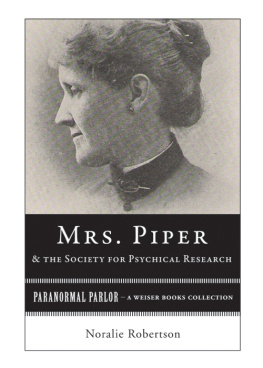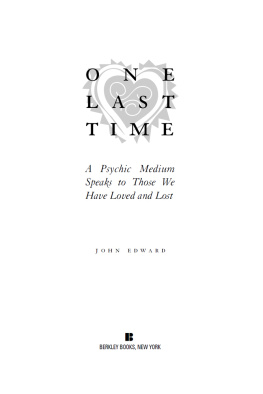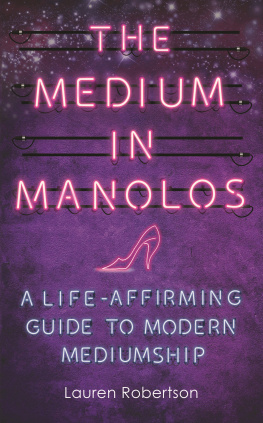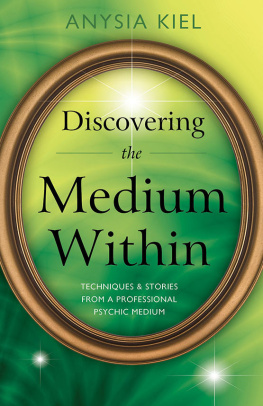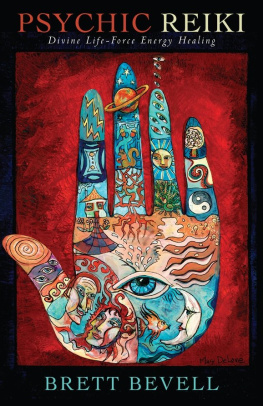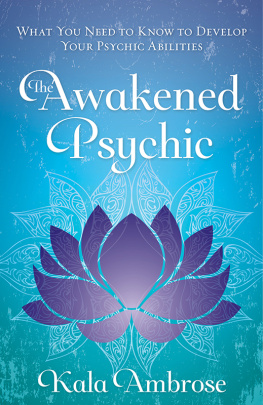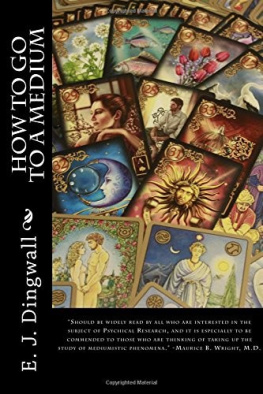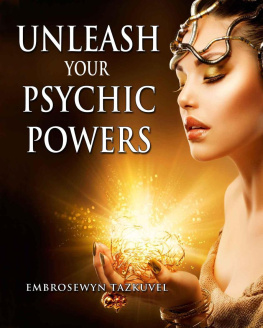Mrs. Piper and the Society for Psychical Research
Noralie Robertson
Varla Ventura
Paranormal Parlor
A Weiser Books Collection
This ebook edition first published in 2011 by Red Wheel/Weiser, LLC.
With offices at:
665 Third Street, Suite. 400
San Francisco, CA 94107
www.redwheelweiser.com
Copyright 2011 by Red Wheel/Weiser LLC. All rights reserved.
Originally published as Mrs. Piper and the Society for Psychical Research by Noralie Robertson. New York: Scott-Thaw Co., 1904.
eISBN: 978-1-61940-006-1
Cover design by Jim Warner
www.redwheelweiser.com
www.redwheelweiser.com/newsletter
Cameo, Corsets, and Channeling
Nothing quite fits the idea of a Paranormal Parlor like the story of a Victorian medium who came to her powers after being diagnosed with a tumor, and who was vetted by the Society for Psychical Research as well as by Dr. Hodgson (who examined also Madame Blavatsky and the Theosophical society and called them all charlatans!)The story of Leonara Piper is a truly remarkable one. She hosted more than one entity, including a French doctor-- Dr. Phinuit-- an actress named Mrs. Siddons, Johann Sebastian Bach, Henry Longfellow, Commodore Vanderbilt (the Italian multi-millionaire) and a young Italian girl named Loretta Ponchini, and by some accounts she also channeled Abraham Lincoln and George Washington! Phinuit is said to be her primary control and appeared most regularly and readily, speaking in a unique French dialect.
Born in 1857 in New Hampshire, Mrs. Piper became one of the most talked about mediums of her time. As the story goes she was suffering from a brain tumor and went to see a well-known spiritualist and psychic medium, after which she began to exhibit the signs of mediumship. She became the subject of extensive investigation by numerous paranormal societies as well as scientists and professors. One of the most notable was William James of Harvard University. His study is included in this book. The original French translations of Phinuit's conversations were done by Minot Savage, a member of the Society for Psychical Research, though the Society itself makes a bit of a disclaimer in the beginning of the book regarding his translations. Mrs. Piper and the Society for Psychical Research explores the story of Mrs. Piper and her resilience against examination after examination, concluding that after fifteen years of experimenting and investigating Mrs. Piper, no evidence of fraud was found.
So read on! Pull up a chair around a heavily-waxed wooden dining table and join the sance. Observe the trances of a woman in corset and cameo, whose life is as extraordinary today as it was so long ago. Take a historical journey into the supernatural, in all of its parlor-room splendor.
In Somber Freakitude,
Varla Ventura
San Francisco, 2011
Table of Contents
PUBLISHER'S NOTE (1904)
It is obvious that such a body of men, pledged to impartial investigation, as the Society for Psychical Research could not officially stand sponsor to the speculative comments of M. Sage, however admittedly clear-sighted and philosophical that French critic may be.
But the publication of this translation has been actually desired and encouraged by many individuals in the Society, it has been revised throughout by a member of their Council, and it is introduced to the general reader by their President.
The Society, indeed, is prepared to accept M. Sage's volume as a faithful and convenient rsum of experiments conducted under its own auspices, and so far as it contains statements of fact, these statements are quoted from authoritative sources. For the comments, deductions or criticisms therein contained, the acute intellect of M. Sage is alone responsible.
It remains only to state in detail the principles on which the original text has been slightly abridged by the translator. No facts or comments have been left out that bear directly on the main subject of the book, the omissions are wholly of matters which might be regarded as superfluous for the understanding of the case of Mrs Piper. Occasionally paragraphs have been condensed, a tendency to vague theorising has been checked throughout, and certain irrelevant matter has been altogether omitted. Such omissions are confined, indeed, to single sentences or paragraphs, with only the exception of a somewhat technical discussion of the Cartesian philosophy in Chapter XVII. It had at first been intended to omit the whole of Chapter XI., as containing only fanciful and non-evidential matter; but statements of this kind form an integral part of the communications, and so, on the whole, it was thought fairer to retain M. Sage's chapter on the subject, especially as it may be found of popular interest.
The original appendix has been incorporated, after modifications, in Chapter XII., since the incident here discussed was in progress as M. Sage wrote and has since been closed. His conjectures as to its possible development are naturally omitted. Finally all references to the Proceedings (or printed reports) of the Society itself have been carefully verified. In every case the words of the reports themselves are given in preference to any re-rendering of M. Sage's translations.
Scott-Thaw Co.
1904
PREFACE
BY THE
President of the Society for Psychical Research
in a rudimentary form, and in a more developed form in certain exceptional individuals. This lucidity may perhaps be regarded as a modification or an exaggeration of the clearness of apprehension occasionally experienced by ordinary persons while immersed in a brown study, or while in the act of waking out of sleep, or when self-consciousness is for a time happily suspended.
In men of genius the phenomenon occurs in the most dignified form at present known to us, and with them also it accompanies a lapse of ordinary consciousness, at least to the extent that circumstances of time and place and daily life become insignificant and trivial, or even temporarily non-existent; but the notable thing is that a few persons, not of genius at all, are liable to an access of something not altogether dissimilar, and exhibit a kind of lucidity or clairvoyant perceptivity, which, though doubtless of a lower grade, is of a well-defined and readily-investigated type, during that state of complete lapse of consciousness known to us as a specific variety of trance.
Not that all trance patients are lucid, any more than all brown studies result in brilliant ideas; nor should it be claimed that some measure of lucidity, even of the ultra-normal kind now under consideration, cannot exist without complete bodily trance. The phenomenon called automatic writing is an instance to the contrary,when a hand liberated from ordinary conscious control is found, automatically as it were, to be writing sentences, sometimes beyond the knowledge of the person to whom the hand belongs. Some approach to unconsciousness, however, either general or local, seems essential to the access of the state, and such conditions as ordinarily induce reverie or sleep are suitable for bringing it on; no one, for instance, would expect to experience it while urgently occupied in affairs. Whether it is desirable to give way to so unpractical an attitude, and to encourage the influx of ideas through non-sensory channels, is another question which need not now concern us. It suffices for us that the phenomenon exists, and that it occasionally though very rarely takes on so well marked and persistent a form as to lend itself to experimental investigation. It is true that in these cases nothing of exceptional and world-compelling merit is produced; the substance of the communication is often, though not always, commonplace, and the form sometimes grotesque. It is true also that a complete record of a conversation held under these circumstancesperhaps a full record of a commonplace conversation held under any circumstancesreadily lends itself to cheap ridicule; nevertheless, the evidence of intimate knowledge thus displayed becomes often of extreme interest to the few persons for whom the disjointed utterances have a personal meaning, although to the outsider they must appear dull, unless he is of opinion that they help him to interpret the more obscure workings of the human mind, or unless he thinks it possible that the nature and meaning of inspiration in general may become better understood by a study of this, its lowest, but at the same time its most definite and controllable, form. Undoubtedly information is attainable under these conditions from sources unknown, undoubtedly the entranced or semi-conscious body or part of a body has become a vehicle or medium for ostensible messages from other intelligences, or for impersonations; but the cause of the lucidity so exhibited, the nature of the channel by which the information is obtained, and the source of the information itself, are questions which, although they are apt to be treated glibly by a superficial critic, to whom they appear the most salient feature and the easiest of explanation, are really the most difficult of all.

